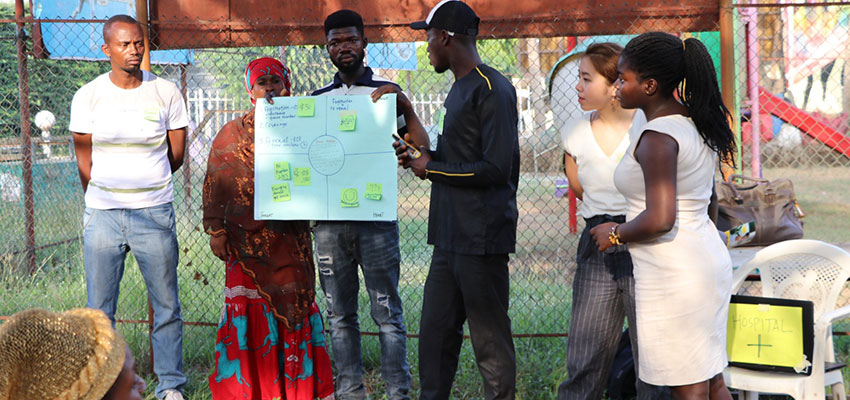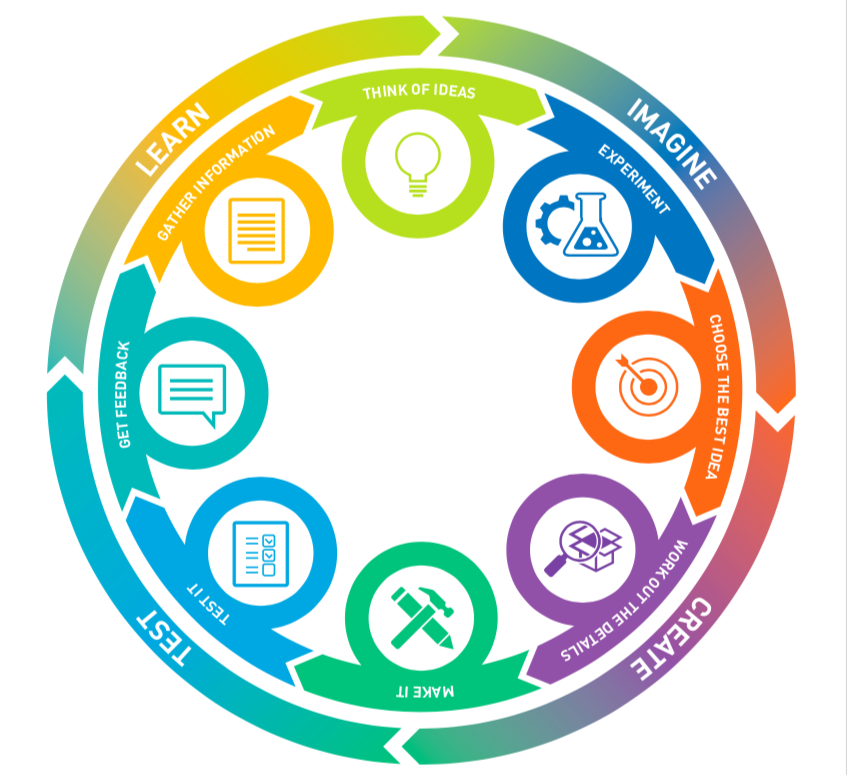
It was the 18th of January 2019, and I sat alone in the Hong Kong International Airport, waiting to board a plane to Addis Ababa (Ethiopia). This would mark the start of my 24-hour flight to Accra, Ghana. I was there with Libby McDonald who teaches two classes I took at MIT D-Lab, D-Lab: Inclusive Economies and D-Lab: Gender and Development, to run a co-design workshop with waste pickers. This two-day workshop was part of a multi-year program called Pick-It!, and is organized by Fan Milk, WIEGO, Environment360, and Ashesi University.
I felt uneasy coming into this trip. I didn’t feel secure about my skills and any value I might add to this project. After all, who was I to facilitate discussion about financial management when I’m neither a financial expert nor do I know anything about waste picking? This has always been my concern when engaging with development projects. Here, my anthropological mind kicks in. Power dynamics in development is a delicate subject. Some claim that development projects are neo-colonial processes, in which more developed countries interfere with developing countries to provide prosperity and progress. In a way, this ensures developed countries’ power over those developing; the dependency and economic-strongholds mimic that of the colonial times. So yes, going to Africa and helping waste pickers seemed like breaking my moral radar (this is extra ironic — as I’m writing, I’m sipping one of the best cappuccinos I’ve tasted in a hipster cafe in Accra).
Teaser alert: my experience turned out exceedingly well. I was wrong about many of the assumptions, and here I will describes some of the things I learned that I think helped the process of co-creating a better future for the waste pickers.
Who was involved?
MIT D-Lab has a long-standing relationship with a group of waste pickers in the Tema region of Accra, Ghana. They are grouped in two major associations called Kpone (mostly young men) and Biakoye (Muslim women). People from local partners Environment360 and WIEGO came and assisted us on implementation. We also had unprecedented visits from Fidelity Bank, which provides the necessary financial tools for waste pickers, and MTN, a teleservice provider. I had the privilege to work with some bright students from the Ashesi University, six of us worked as a team to design the workshop curriculum and facilitate discussion. And of course, Libby McDonald was there the whole time to mobilize and give us the tools to facilitate discussions, as well as Johnson Asante, our lovely local implementation leader.
What was it about really? Co-Design!
The Co-Design Workshop was focused on finding effective financial management tools for waste pickers in Accra. Co-design/Design thinking is the method (beautifully illustrated below) that we used to shape the two-day workshops.

In my opinion, design thinking is less of a process but more of a mindset. It requires participants to be open-minded learners, gathering information about their current challenges and coming up with practical solutions. This was integrated into our objectives for the Co-Design Workshop:
- To inspire design thinking mindsets among the waste pickers and the company representatives
- To co-create a blueprint for appropriate financial management tools
- To validate the knowledge of existing financial products among the waste pickers
- To ensure sustainability of the solutions that emerge from the workshop
- To create awareness in company representatives of informal sector financial management needs
At first, I didn’t believe in the power of design thinking. But I was dumbfounded by its effect by the end of the workshop. On the first day, our collective target was to come up with a problem statement within our respective groups: health insurance, savings, mobile money. We worked long and hard to pinpoint the pain points raised by the waste pickers. I am not sure if that is the essence or a curse with the design thinking process. When I was facilitating the discussion, the waste-pickers complained about the logistics of insurance registration, they also mentioned that even after they are registered some hospitals won’t accept their insurance plan, and they often have to pay out of pocket. I was really weighed down by the discussions even as a facilitator. The point of the exercise was to dig out all the problems, which is hard by itself; then, to pick ONE that represented the waste-pickers, which I found difficult and somewhat unfair due to the magnitude of challenges. But the design process helped us to focus on things that were within our power to change. So all in all, it was an effective and necessary process.
Our job on the second day was to come up with a prototype for the challenge on Day 1 — another painstaking process! All I could say is that it required a lot of brain juice to imagine and innovate a solution that works for the waste pickers. But we did it eventually, the waste pickers were able to co-create a prototype that they are excited to implement and solve their current challenges. This put into perspective how difficult it is to make changes in the field of development. To make sure that changes are effective and sustainable, sometimes what it takes is for 30 people to sit under a tree for two days straight, grill the problems, and work on the solutions. But it also demonstrated that changes are possible if we are willing to put in the effort. In fact, it is not about the difficulty of the issue, but how willing are people to work together. I could testify to this after sitting through a few grueling meetings with our implementation team after this workshop.
Some concluding thoughts
I came into this project with the fear that I was in no position to tell waste pickers what financial management tools they would need. But the waste pickers were truly the rockstars in this project. Our role was to share problem-solving toolkits, such as writing PATH statements, using the Pugh and Gantt chart to execute prototypes — I was just another designer like the rest of the waste-pickers. In fact, they have a more important job of actually implementing these things when I am back in the isolated-institution-of-Wellesley-College! This experience helped me to deal with some cynicism I have about development projects — when done well, they can really leave a lasting change.
Fiona Lau is a senior at Wellesley College studying Political Science and Anthropology who took D-Lab: Inclusive Economies in spring of 2018 and D-Lab: Gender and Development in fall of 2018.
Contact
Libby McDonald, lecturer and MIT D-Lab Inclusive Economies Specialist

